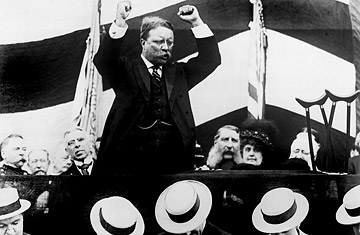
President Theodore Roosevelt speaks to a crowd in New York.
In his 1907 State of the Union address, Theodore Roosevelt, dismayed that there were no laws to "hamper an unscrupulous man of unlimited means from buying his own way into office," proposed "a very radical measure" he hoped might make elections more fair and transparent. (To his great embarrassment, Roosevelt himself had been hit with accusations that he promised a French ambassadorship to a senator from New York in exchange for $200,000 in big business campaign donations.) "The need for collecting large campaign funds would vanish if Congress provided ... an appropriation ample enough to meet the necessity for thorough organization and machinery, which requires a large expenditure of money," Roosevelt said, adding that candidates who took public funds should be required to limit donation amounts and publicly disclose their receipts. If that sounds familiar it's because Roosevelt's proposal is essentially the system we have today — although its adoption didn't come about for another 64 years.
In 1971, Congress passed the Federal Election Campaign Act, which required candidates to report expenses and contributions, and the Revenue Act, which set up a Presidential Election Campaign Fund, financed by an optional checkoff box on income tax returns that diverted $1 (since raised to $3) from the U.S. Treasury. Candidates were offered large lump sums to cover expenses related to the general election, so long as they agreed not to collect private donations or spend money raised for primary contests. As Watergate unfolded between 1972 and 1974, amid allegations (later substantiated) that Richard Nixon used large campaign contributions for illegal purposes, Congress amended the public finance laws to limit individual contributions and provide primary candidates with matching funds on small donations. The new legislation also set up the Federal Election Commission (FEC).
In every election since, candidates taking federal funds for the primary contest agreed to spend a limited amount — set by the FEC — during that stage of the campaign. But candidates must manage their money carefully: Bob Dole reached his spending limit in the 1996 race months before the party's summer convention, leaving him gasping in the final weeks of primaries and prompting George W. Bush to opt out of public primary funding altogether in the 2000 election. (Bush did take $67.6 million in general election public funds.) In 2004, John Kerry and Howard Dean also opted out of primary public funding, with Dean sending an e-mail to supporters asking for their blessing.
Now, however, public finance advocates fear that Democratic candidate Barack Obama's decision to change his position and forgo all public funding may signal an end to Roosevelt's apparatus for good. Obama, who would get about $84 million in public funds for the general election, stands to raise hundreds of millions more through private donations. The Illinois Senator contends he'll need that money to fend off attacks from tax-exempt advocacy organizations — known as 527 groups, after the section of the tax code under which they are formed — which, Obama said, will spend "millions and millions of dollars in unlimited donations" to damage his reputation. (So far, a well-funded 527 movement against him has not materialized.) His Republican rival, John McCain, said Obama "has completely reversed himself and gone back, not on his word to me, but the commitment he made to the American people." McCain, has said he will accept the public funding available for the general campaign, although he is also the subject of a lawsuit filed by the Democratic National Committee, alleging he violated election funding rules by using promised federal primary funds that he later turned down to secure a loan.
Campaign finance reform has been a career cause for the Arizona senator, highlighted by the Bipartisan Campaign Reform Act of 2002, which he championed with Democrat Russ Feingold. Although the act contained landmark transparency provisions, outside influence on elections is still pervasive, with 527 groups like the anti-John Kerry organization Swift Boat Veterans for Truth and the liberal group MoveOn.org's Voter Fund playing major roles in the last presidential election. This year's election will be the most expensive in history — presidential candidates have already raised over $900 million, according to the Center for Responsive Politics. And that's not counting the millions in the coffers of the parties, political action committees and advocacy groups that are just now gearing up their advertising campaigns. A century on, the laws have changed, but the reality hasn't. Running a national election campaign still costs serious amounts of money, and no candidate has ever won a national office on good ideas alone.
